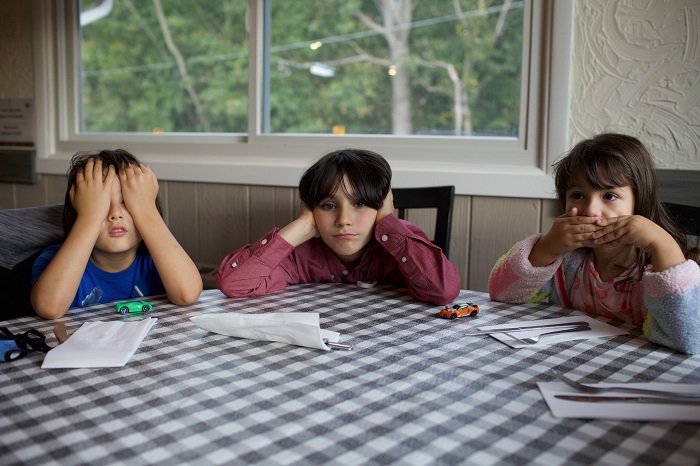Learning some ways to help your child cope with moving may not be high on your priority list right now (can anyone say pandemic,) but at some point in their lives they will definitely benefit. You will too, mom and dad. 

How To Help Your Child Cope With Moving
Expect a reaction
There’s a slight chance your child will not be as excited as you are about the move. Expect a negative reaction! Of course, that’s only natural and nothing to be surprised by. There’s no need to overemphasize how kids can get emotional. But don’t worry! You’ll have a chance to talk to them about your decision and explain it’s not so tragic that you have to relocate. More about the talk in the paragraph below.

Don’t expect your child to be excited about the move. It’s more likely they’ll imitate the boy in the picture.
Talk to them like you would talk to adults
Most people think kids can’t understand the adult world, so they never treat their children as equals. You’d be amazed at how kids can act when they notice you treat them with the respect you give adults. Try it out! Since you’re relocating, you have an opportunity to find out if this theory (let’s call it that) works in practice. Of course, the reaction can depend solely on the individual character of the kid, but there’s a good chance you’ll have success by talking to them like you would to adults.
Tell me once again, why are we moving?
Now that we’ve figured out the approach, let’s talk about how you will explain to your kids why you have to move. Let’s say you’re about to move long-distance with your children, far away from your soon-to-be old home. Your kiddos deserve a proper explanation, right? To get them ready for this long journey, you’ll need to introduce a couple of topics. First, try to explain to them why the decision you’ve made is so important. Since you’re planning a long-distance move, you probably have some strong arguments that go in favor of relocating. Lay them out! After you’ve done that, talk about the stuff they can expect in their new neighborhood and surroundings. For example, you can mention all the friends they’re going to meet, the fun places and activities that are nearby your new home and so on.

When talking to your kids about the upcoming relocation, focus solely on the positive side (they’ll get to meet new friends). Make them understand that change is not something to be afraid of.
Involve them in the preparations
Once they figure out that moving is not an end-of-the-world kind of ordeal, you can easily involve them in the preparations. Not so much because you somehow need an additional workforce, but because you need to make them feel important. When they realize they’re a part of the relocation process as much as you and your spouse, they’ll have a different perspective on the process. They won’t feel excluded, but rather they’ll feel like an equal part of the family. Even though most folks would rather keep their kids out of the preparation process, find some neat little chores you can give them.
Conduct a farewell extravaganza
Okay, that title might be just a little over the top. Anyway, it would help if you threw an unforgettable farewell party for your friends and their children. Also, don’t forget to invite your child’s neighbourhood or school friends. They’ll have a chance to say goodbye in the best manner possible. How about a backyard barbecue and some delicious cake later? Rare are those who’d turn down that type of invitation. Organize a piñata for the little folks. Here’s some additional info: tell your kiddos how important it is they stay in contact with their old neighbourhood friends. Use the opportunity to teach them some great life values.

After the move: set up the kids’ room as soon as possible
Now, this is a fantastic tip on how to help your child cope with moving. Mark the boxes with the items that go in the kids’ room in a unique way so that you remember to load them last into the truck. Those boxes will, of course, be the first ones to go into your new home. You can finish the rest of your new home later, as the kids’ room should be your top priority. That way, your children will notice things haven’t changed so much after all. You would be amazed at how exciting it is to find new places to put your well-loved items.
Final words on how to help your child cope with moving
Let’s do a quick summary of the ideas introduced above on how to help your child cope with moving. First, expect a negative reaction from your children. Rare are the cases in which the kids react cheerfully to the idea of moving. Talk to them in a respectful manner about all that lies ahead and lay out the arguments for the move. Focus solely on the positive side of relocating. Try to involve them in the preparations. Children appreciate being included. Let’s not forget that it would be cool if you were to throw a farewell party for everyone. Last but not least: once you move, do the kids’ room first.
Have many times have you moved in your life? Was the experience good? Bad? Or ugly? Is there any advice you can add to this article?
FT&PD
Suz
**If you would like me to review your product, service, restaurant or travel destination, please send me an email at rudges2@gmail.com , tweet me at @MapleMouseMama or DM me on Instagram!!
I had to move several times when I was a kid and the worst part was making new friends and going to a new school